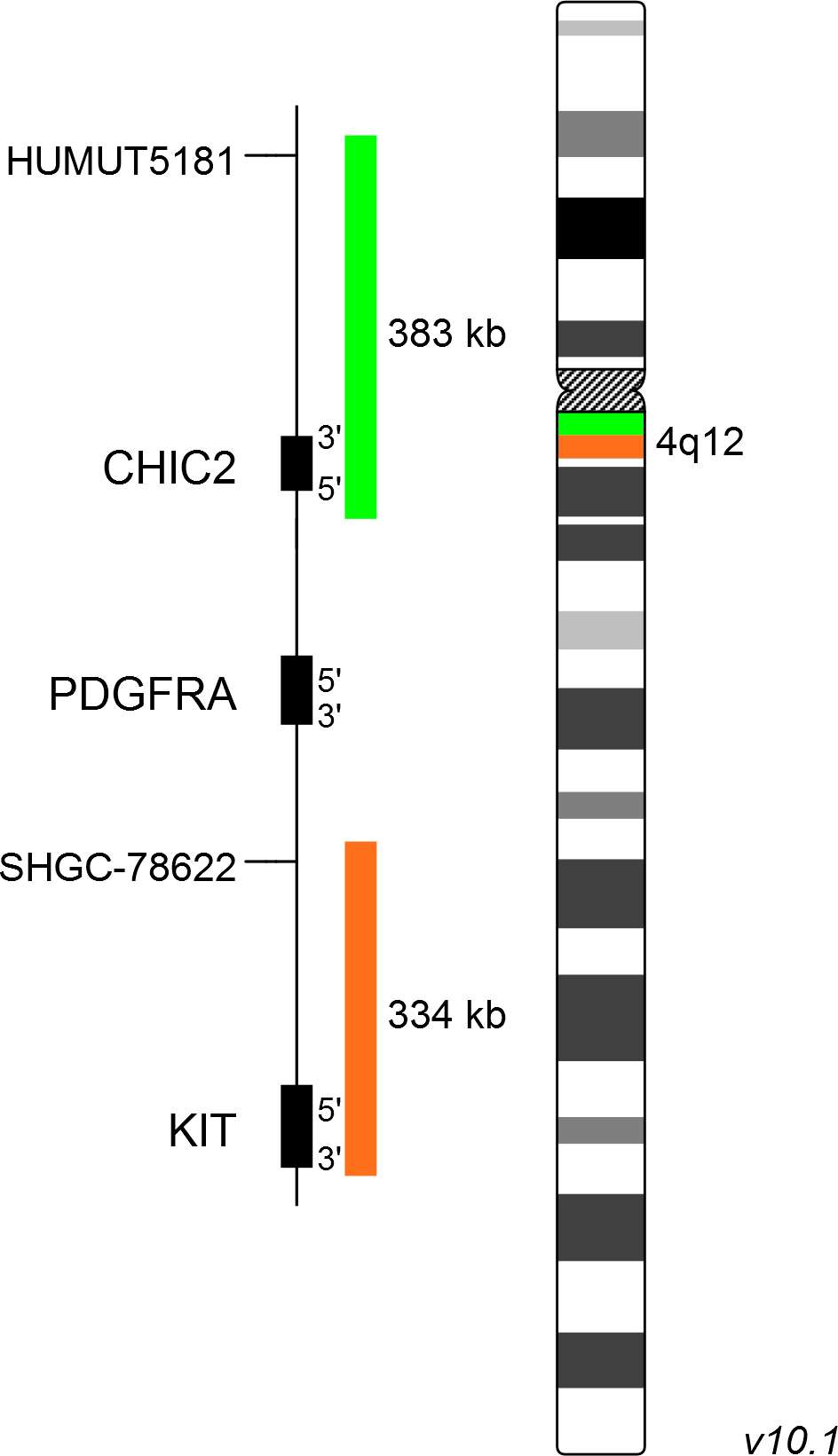XL PDGFRA BA

XL PDGFRA BA is designed as a break apart probe. The orange labeled probe hybridizes distal to the breakpoint in the PDGFRA gene region at 4q12, the green labeled probe hybridizes proximal to the breakpoint and covers the CHIC2 gene.
The category ´myeloid/lymphoid neoplasms with eosinophilia and rearrangement of PDGFRA, PDGFRB or FGFR1, or with PCM1/JAK2´ of the revised 4th edition of the WHO classification defines three particular groups with rearrangements in PDGFRA, PDGFRB or FGFR1 and a provisional entity with PCM1/JAK2 rearrangement. The clinical manifestations within this category are numerous and heterogeneous and include myeloproliferative neoplasms, myelodysplastic syndromes as well as de novo or secondary mixed phenotype acute leukemia and lymphomas. Neoplasms with eosinophilia are associated with dysregulated tyrosine kinases, usually as a result of gene fusions. It is of great importance to identify the genes involved because aberrant tyrosine kinases react with varying sensitivity to tyrosine kinase inhibitors. Patients with PDGFRA and PDGFRB rearrangements are responsive to imatinib whereas FGFR1-related diseases are non-responsive. PDGFRA rearrangements are usually associated with chronic eosinophilic leukemia (CEL). The most frequent PDGFRA-related aberration is the interstitial deletion of the CHIC2 gene with breakpoints in the FIP1L1 and PDGFRA genes. The deletion of a fragment of about 800kb is resulting in the FIP1L1-PDGFRA fusion gene, a constitutively activated tyrosine kinase transforming hematopoietic cells. In FISH assays, the detection of CHIC2 deletion at 4q12 is a surrogate for the direct detection of the FIP1L1-PDGFRA fusion gene. Translocations with other partner genes, resulting in aberrant tyrosine kinase activity, are known. Involvement of PDGFRA can be detected by break apart strategies with FISH.
Cena za kus: pro registrované
The category ´myeloid/lymphoid neoplasms with eosinophilia and rearrangement of PDGFRA, PDGFRB or FGFR1, or with PCM1/JAK2´ of the revised 4th edition of the WHO classification defines three particular groups with rearrangements in PDGFRA, PDGFRB or FGFR1 and a provisional entity with PCM1/JAK2 rearrangement. The clinical manifestations within this category are numerous and heterogeneous and include myeloproliferative neoplasms, myelodysplastic syndromes as well as de novo or secondary mixed phenotype acute leukemia and lymphomas. Neoplasms with eosinophilia are associated with dysregulated tyrosine kinases, usually as a result of gene fusions. It is of great importance to identify the genes involved because aberrant tyrosine kinases react with varying sensitivity to tyrosine kinase inhibitors. Patients with PDGFRA and PDGFRB rearrangements are responsive to imatinib whereas FGFR1-related diseases are non-responsive. PDGFRA rearrangements are usually associated with chronic eosinophilic leukemia (CEL). The most frequent PDGFRA-related aberration is the interstitial deletion of the CHIC2 gene with breakpoints in the FIP1L1 and PDGFRA genes. The deletion of a fragment of about 800kb is resulting in the FIP1L1-PDGFRA fusion gene, a constitutively activated tyrosine kinase transforming hematopoietic cells. In FISH assays, the detection of CHIC2 deletion at 4q12 is a surrogate for the direct detection of the FIP1L1-PDGFRA fusion gene. Translocations with other partner genes, resulting in aberrant tyrosine kinase activity, are known. Involvement of PDGFRA can be detected by break apart strategies with FISH.
Cena za kus: pro registrované




